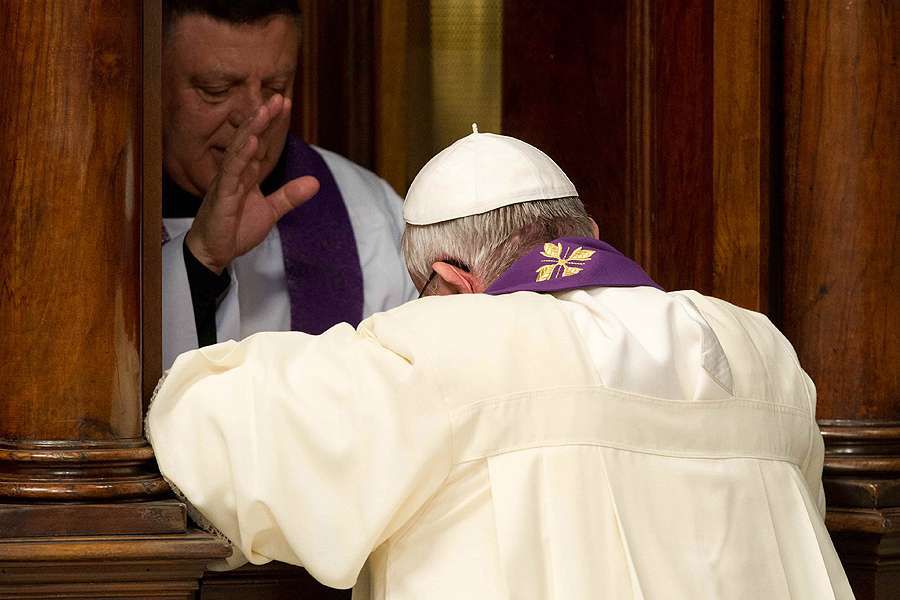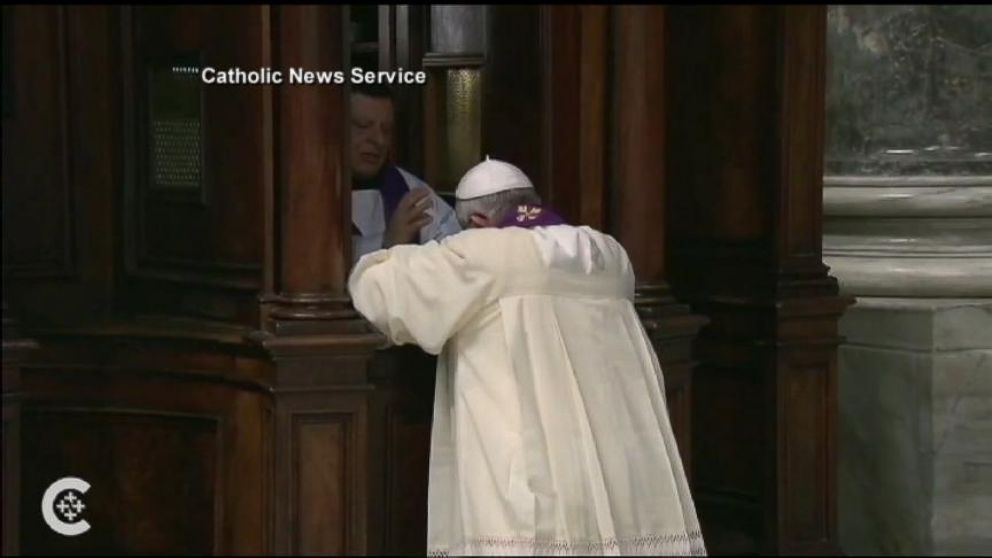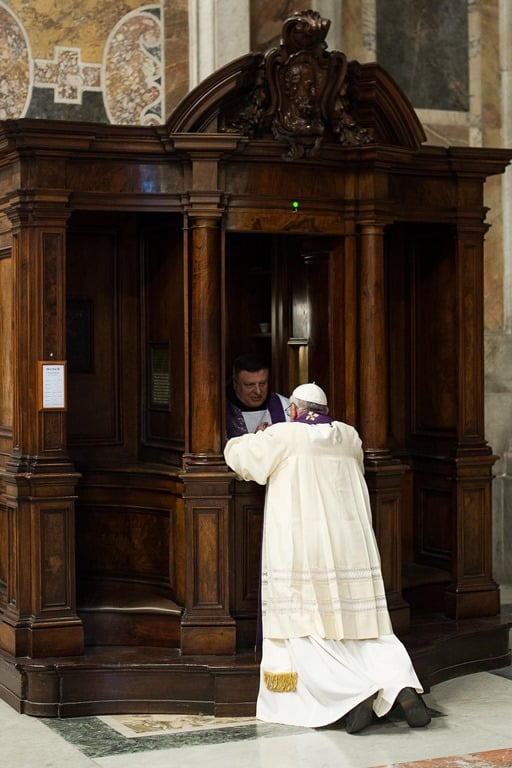Picture this: you're sitting in a quiet room, candles flickering, and the air is thick with anticipation. Suddenly, the doors open, and there he is—Pope Francis. But today, it's not about the grandeur of the Vatican or the solemnity of mass. Today, we dive deep into the world of confession Pope Francis, not just as a religious figure but as a human being who connects with people on a deeply personal level. This is more than a story; it's an exploration of faith, humility, and the power of confession.
Now, confession Pope Francis isn't just about the religious ritual we all know. It's about the man himself, his journey, and how he's transforming the way people view the Catholic Church. Pope Francis has a knack for making the complex seem simple, and that's exactly what we aim to do here—break down the barriers and bring you closer to understanding this incredible leader.
So, buckle up because we're about to take you on a journey through the life, teachings, and confessions of Pope Francis. From his early days in Argentina to his current role as the spiritual leader of over a billion Catholics, this is a story worth telling. And trust me, you don't want to miss a single word.
Read also:Cynthia Bailey Calls Life A Mess A Candid Look Into Her World
Table of Contents
- Biography of Pope Francis
- Early Life and Formation
- Religious Journey and Call to Priesthood
- The Papal Election That Changed Everything
- Understanding the Confession Practice of Pope Francis
- Modernizing the Church Through Confession
- Key Teachings and Philosophies
- Challenges and Criticisms
- Impact on Global Religion
- Conclusion: Why Pope Francis Matters
Biography of Pope Francis
Before we dive into the heart of confession Pope Francis, let's take a moment to understand the man behind the title. Pope Francis, born Jorge Mario Bergoglio, is the first pope from the Americas and the first Jesuit pope. His journey from a young boy in Buenos Aires to the leader of the Catholic Church is nothing short of remarkable.
Here's a quick snapshot of his life:
| Full Name | Jorge Mario Bergoglio |
|---|---|
| Birth Date | December 17, 1936 |
| Place of Birth | Buenos Aires, Argentina |
| Ordained Priest | December 13, 1969 |
| Became Archbishop of Buenos Aires | 1998 |
| Elected Pope | March 13, 2013 |
His biography is a testament to his commitment to service and humility, qualities that shine through in his approach to confession and leadership.
Early Life and Formation
Let's rewind the clock and explore the early life of Pope Francis. Born into a modest family, Jorge Mario Bergoglio grew up in a neighborhood where humility and hard work were the norm. His father was an accountant, and his mother was a homemaker. From a young age, he showed a keen interest in the church, often attending mass and participating in youth groups.
Key Moments in His Youth
- At the age of 17, he suffered from a severe illness that led to the removal of part of his lung.
- He initially pursued a career in chemistry but soon realized his true calling lay in the priesthood.
- He entered the Society of Jesus in 1958, marking the beginning of his journey toward priesthood.
These early experiences shaped the man he would become, instilling in him a deep sense of compassion and a desire to serve others.
Read also:Racist Threats As Payment Denied Understanding The Growing Concern
Religious Journey and Call to Priesthood
Now, let's fast forward to his religious journey. Pope Francis' decision to enter the priesthood was not a sudden one. It was a calling that grew over time, nurtured by his deep faith and desire to make a difference in the world.
Here are some pivotal moments in his religious journey:
- In 1969, he was ordained a priest, marking the start of his formal ministry.
- He served in various capacities within the Jesuit order, including as a rector and provincial superior.
- His dedication to social justice and pastoral care earned him a reputation as a compassionate and effective leader.
These experiences laid the foundation for his future role as pope, where he would continue to champion the causes of the marginalized and the poor.
The Papal Election That Changed Everything
When Pope Francis was elected in 2013, it sent shockwaves through the Catholic world. The choice of a pope from the Americas was unprecedented, and his decision to take the name "Francis" was a nod to St. Francis of Assisi, known for his humility and care for the poor.
What Made This Election Special?
- It marked a shift in the geographical focus of the papacy, highlighting the growing influence of the church in the Southern Hemisphere.
- Pope Francis' emphasis on simplicity and accessibility resonated with people around the world.
- His vision for a more inclusive and compassionate church set the tone for his papacy.
This election wasn't just about choosing a new leader; it was about reimagining what the Catholic Church could be.
Understanding the Confession Practice of Pope Francis
Now, let's talk about confession Pope Francis. For many, the concept of confession can seem daunting, but Pope Francis has a way of making it feel approachable and meaningful. His approach to confession is rooted in his belief in mercy and forgiveness.
Key Aspects of His Confession Philosophy
- He emphasizes the importance of a personal relationship with God, encouraging people to see confession as a dialogue rather than a formality.
- Pope Francis often speaks about the need for priests to be compassionate and understanding during confession, recognizing the human element in every person.
- He encourages regular confession as a way to grow spiritually and deepen one's faith.
His approach to confession is a reflection of his broader philosophy of mercy and inclusion, making it accessible to people from all walks of life.
Modernizing the Church Through Confession
Pope Francis has been at the forefront of efforts to modernize the Catholic Church, and confession plays a key role in this transformation. By redefining the way confession is practiced and perceived, he's helping to bridge the gap between the church and its followers.
How Is He Modernizing Confession?
- He advocates for a more open and honest dialogue during confession, encouraging people to share their struggles and seek guidance.
- He emphasizes the role of confession in fostering community and connection, rather than just individual salvation.
- Through his teachings and example, he's helping to create a more inclusive and welcoming church.
These efforts are part of a larger movement to make the Catholic Church more relevant and accessible in today's world.
Key Teachings and Philosophies
Pope Francis' teachings and philosophies are deeply rooted in his vision of a compassionate and inclusive church. His approach to confession is just one aspect of a broader mission to transform the way people think about faith and spirituality.
What Are Some of His Key Teachings?
- He stresses the importance of mercy and forgiveness, both in confession and in daily life.
- He advocates for social justice, calling on the church to stand with the marginalized and the oppressed.
- He encourages environmental stewardship, recognizing the interconnectedness of all creation.
These teachings reflect his commitment to creating a more just and compassionate world, one confession at a time.
Challenges and Criticisms
No leader is without challenges, and Pope Francis is no exception. His efforts to modernize the church and redefine confession have not been without opposition. Some traditionalists view his approach as too radical, while others question his ability to effect real change.
What Are Some of the Challenges He Faces?
- Resistance from within the church hierarchy to his reforms and innovations.
- Criticism from those who feel his emphasis on mercy and inclusion undermines traditional teachings.
- Efforts to address complex issues like clergy abuse and church governance.
Despite these challenges, Pope Francis remains steadfast in his mission, continuing to push for change and reform.
Impact on Global Religion
Pope Francis' impact on global religion cannot be overstated. His approach to confession and leadership has resonated with people of all faiths, drawing attention to the universal themes of mercy, compassion, and justice.
What Is His Legacy So Far?
- He has helped to reshape the image of the Catholic Church, making it more accessible and welcoming to a global audience.
- His teachings on social justice and environmental stewardship have inspired people around the world to take action.
- Through his example, he's shown that faith can be a powerful force for good in a rapidly changing world.
His legacy is one of transformation and renewal, reminding us of the power of faith to change lives and communities.
Conclusion: Why Pope Francis Matters
As we wrap up our exploration of confession Pope Francis, it's clear that his impact extends far beyond the walls of the Vatican. He's not just a religious leader; he's a catalyst for change, a voice for the voiceless, and a beacon of hope in a troubled world.
So, what can you do? Share this article with someone who might benefit from it. Leave a comment with your thoughts or questions. And most importantly, take a moment to reflect on how confession and faith can transform your own life. Because at the end of the day, that's what Pope Francis is all about—making the world a better place, one confession at a time.


